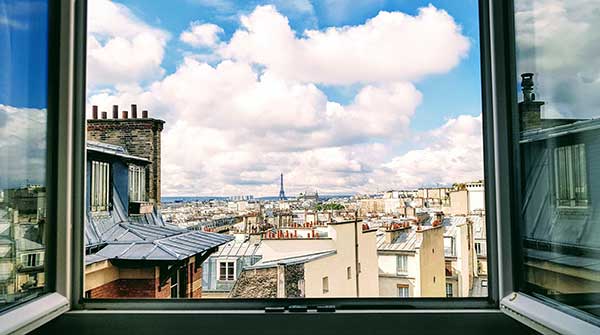A multilingual guide to finding accommodation in Europe
Europe is a continent known for its rich history, diverse cultures, and stunning landscapes. Whether planning a whirlwind tour of Europe’s bustling cities or a tranquil retreat in its picturesque countryside, finding the right place to sleep is essential for a memorable trip.
While English may be widely understood in many European countries, venturing off the beaten path can present language barriers that require a bit of linguistic finesse. Let’s explore how to find accommodation in Europe, even if you don’t speak the local language.
English-speaking countries
 Photo by Isaiah B |
| More Travel Tips |
| Hostels are your key to budget-friendly travel
|
| When to stay at an expensive hotel
|
| The ABCs of B&Bs
|
Let’s start with the countries where English is widely spoken, which makes the process relatively straightforward:
- United Kingdom: In the UK, you can easily find hotels, inns, and pubs that offer accommodation. The term “pubs” may seem unusual, but many traditional British pubs have rooms for guests. But keep in mind that not all inns, lodges, or pubs may offer lodging services.
- Ireland: Similar to the UK, Ireland offers a range of hotels, inns, and pubs with rooms for travellers. The term “guesthouse” is also commonly used here.
- Malta: Malta is an English-speaking destination where you can find hotels and guesthouses for your stay. The local word for a hotel is “lukanda.”
French-speaking countries
Next, let’s explore countries where French is the primary language:
- France: While “hotel” is commonly used in France, you might also come across terms like “l’hostellerie” and “auberge,” both of which refer to places offering accommodation. For upscale lodging, look for “Chateau” or “Relais and Chateaux.” Smaller accommodations are often referred to as “logis,” and “Mas” indicates a farmhouse-style stay.
- Belgium: In Belgium, you’ll find “hotels” for accommodation. “Auberge” and “herberg” are also used in some regions, especially in French-speaking Wallonia.
- Switzerland: Switzerland primarily uses “hotel” for accommodation. The Swiss also use the term “gasthof” or “gasthaus,” particularly in German-speaking regions.
Italian-speaking countries
Now, let’s explore countries where Italian is spoken:
- Italy: In Italy, the term “albergo” is widely used to refer to hotels. “Locanda” is another word you might encounter. “Pensione” might sound like a bed and breakfast (B&B), but it often refers to small family-run hotels. For upscale stays, look for “Palazzos.” If you want a rural experience, search for “agriturismos.”
- San Marino: In this tiny country surrounded by Italy, you’ll find “hotels” for accommodation.
German-speaking countries
Here are countries where German is the primary language:
- Germany: “Hotel” is the term for accommodation in Germany. You might also find “gasthof” or “gasthaus” in smaller towns. For a spa resort, look for places with “Bad” (bath) in the name. A small local place might be called a “pension.”
- Austria: Austria uses “hotel” for accommodation. You might see “gasthof” or “gasthaus” signs, especially in rural areas.
- Switzerland: As mentioned earlier, Switzerland also uses “hotel” for accommodation, alongside “gasthof” or “gasthaus” in German-speaking regions.
Spanish and Portuguese-speaking countries
Now, let’s delve into countries where Spanish and Portuguese are spoken:
- Spain: In Spain, you’ll find unique historical accommodations known as “Paradors.” These are often restored castles, monasteries, and other historic buildings. Other terms to look for are “residencia” and “pension.”
- Portugal: Portugal offers “Pousadas” for stays in historic buildings. For budget-friendly options, search for “Pensoes.”
Scandinavian countries
For our last group, we’ll explore countries in Scandinavia:
- Sweden: Sweden primarily uses “hotell” for accommodation. You might also encounter “vandrarhem,” which refers to hostels.
- Norway: Norway uses “hotell” for hotels and “herberge” for hostels. “Pensjonat” is another term for accommodations.
- Denmark: Denmark uses “hotel” for accommodation. For budget stays, look for “vandrehjem,” which, again, means hostels.
- Finland: In Finland, you’ll find “hotelli” for hotels and “hostelli” for hostels.
Multilingual signs
In some European countries, you may see signs displaying accommodation information in multiple languages, including English. These signs often use universally recognized terms like “hotel” or “motel.” Additionally, you might see “garni” or “hotel garni,” which indicates limited restaurant facilities, usually serving breakfast only. These places are similar to standard hotels and are typically rated by star systems within their respective countries.
Navigating the diverse linguistic landscape of Europe can be an enriching part of your travel experience. With this multilingual guide, you’ll be better prepared to find accommodation across the continent, regardless of language barriers. So, next time you explore Europe, don’t be surprised if you see a sign that says “hotel” or “auberge” – it’s all part of the adventure.
| The Frugal Traveller
The opinions expressed by our columnists and contributors are theirs alone and do not inherently or expressly reflect the views of our publication.
© Troy Media
Troy Media is an editorial content provider to media outlets and its own hosted community news outlets across Canada.
